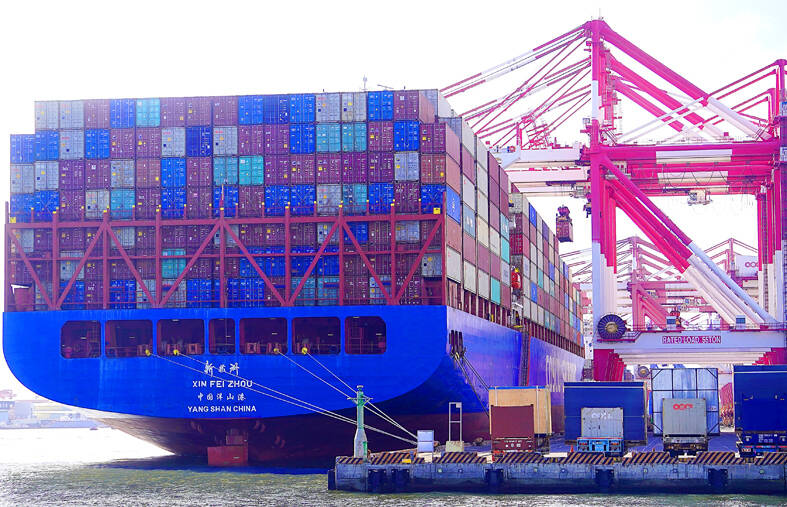Taiwan’s official manufacturing purchasing managers’ index (PMI) last month shed 1.5 points to 52.2, staying in expansion mode for the third straight month, although uncertainty linked to the US presidential race caused a stir, the Chung-Hua Institution for Economic Research (CIER, 中華經濟研究院) said yesterday.
The PMI published yesterday by S&P Global also showed that Taiwan’s factory activity continued to expand last month, falling to 52.9 from 53.2 in June.
PMI data seek to measure the health of the manufacturing industry with values of 50 and higher suggesting expansion and points below the neutral threshold indicating contraction.

Photo: CNA.
“Things remain positive overall, but recent remarks by US presidential candidates revived concern over tariff hikes,” CIER president Lien Hsien-ming (連賢明) said.
Taiwanese firms turned from feeling upbeat to cautious after former US president and Republican Party presidential nominee Donald Trump said in an interview last month that Taiwan “took all of [the US’] chip business” and should pay the US for defense. Trump has also pledged to raise tariffs on imports to address what he calls unfair trade practices.
The subindex on new business orders weakened 5.3 points to 53.9, while the industrial production subindex lost 2.5 points to also reach 53.9, the Taipei-based think tank said, citing a monthly survey.
Tech firms generally saw their business pick up, but firms involved in the supply of transportation tools, basic raw materials and machinery equipment reported business decreases, the institute said.
Firms conservatively increased their payroll and sought mostly to meet demand by enhancing their operating efficiency, it said, explaining why the measure on employment added a tiny 0.7 points to 51.9.
The subindex on inventory lost 0.4 points to 49, while clients’ inventory gained 1.5 points to 44.6, consistent with a cautious approach, the survey showed.
The gauge on raw material prices dropped 3.2 points to 57.3, remaining elevated and a concern for margin pressure, the institute said.
The six-month outlook declined 4.2 points to 55, as the US presidential election affected corporate confidence while the high sales season draws near, it said.
The business reading on non-manufacturing sectors fell 1.3 points to 57.3, expanding for 21 consecutive months, with all service-oriented sectors faring well, the institute said in a separate survey.
Private consumption held strong even though the TAIEX pulled back and the central bank tightened credit controls, Lien said.

The US dollar was trading at NT$29.7 at 10am today on the Taipei Foreign Exchange, as the New Taiwan dollar gained NT$1.364 from the previous close last week. The NT dollar continued to rise today, after surging 3.07 percent on Friday. After opening at NT$30.91, the NT dollar gained more than NT$1 in just 15 minutes, briefly passing the NT$30 mark. Before the US Department of the Treasury's semi-annual currency report came out, expectations that the NT dollar would keep rising were already building. The NT dollar on Friday closed at NT$31.064, up by NT$0.953 — a 3.07 percent single-day gain. Today,

‘SHORT TERM’: The local currency would likely remain strong in the near term, driven by anticipated US trade pressure, capital inflows and expectations of a US Fed rate cut The US dollar is expected to fall below NT$30 in the near term, as traders anticipate increased pressure from Washington for Taiwan to allow the New Taiwan dollar to appreciate, Cathay United Bank (國泰世華銀行) chief economist Lin Chi-chao (林啟超) said. Following a sharp drop in the greenback against the NT dollar on Friday, Lin told the Central News Agency that the local currency is likely to remain strong in the short term, driven in part by market psychology surrounding anticipated US policy pressure. On Friday, the US dollar fell NT$0.953, or 3.07 percent, closing at NT$31.064 — its lowest level since Jan.

The New Taiwan dollar and Taiwanese stocks surged on signs that trade tensions between the world’s top two economies might start easing and as US tech earnings boosted the outlook of the nation’s semiconductor exports. The NT dollar strengthened as much as 3.8 percent versus the US dollar to 30.815, the biggest intraday gain since January 2011, closing at NT$31.064. The benchmark TAIEX jumped 2.73 percent to outperform the region’s equity gauges. Outlook for global trade improved after China said it is assessing possible trade talks with the US, providing a boost for the nation’s currency and shares. As the NT dollar

The Financial Supervisory Commission (FSC) yesterday met with some of the nation’s largest insurance companies as a skyrocketing New Taiwan dollar piles pressure on their hundreds of billions of dollars in US bond investments. The commission has asked some life insurance firms, among the biggest Asian holders of US debt, to discuss how the rapidly strengthening NT dollar has impacted their operations, people familiar with the matter said. The meeting took place as the NT dollar jumped as much as 5 percent yesterday, its biggest intraday gain in more than three decades. The local currency surged as exporters rushed to